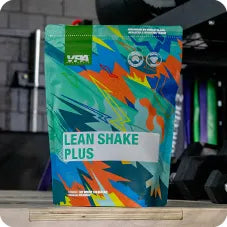Your Cart is Empty
Best Supplements to Increase Strength and Hit New PRs
May 06, 2024 4 min read

Strength training remains a cornerstone of physical development, promoting muscular hypertrophy (growth), improved bone density, and enhanced metabolic health. However, maximising strength gains and achieving personal records (PRs) often requires a multifaceted approach, encompassing not just optimised training routines but also strategic dietary practices and potentially beneficial supplementation. This article discusses the potential benefits of various supplements commonly used by strength training athletes to support their pursuit of new PRs.
1. Protein Powder
Protein serves as the building block of muscle tissue. After an intense workout, your body craves protein to repair and rebuild those microscopic tears you create by lifting heavy things (that's a good thing!). While a balanced diet rich in whole foods like lean meats, fish, and legumes can provide sufficient protein for most individuals, athletes with demanding training programs may struggle to meet their elevated protein requirements.
Protein powder offers a convenient and concentrated source of protein, facilitating the daily intake necessary for muscle repair and growth. Research suggests a daily protein intake of 1.6-2.2 grams per kilogram of body weight may be optimal for maximising muscle protein synthesis (MPS) during resistance training. Whey protein, a fast-digesting protein source, is particularly popular due to its rapid absorption rate, potentially leading to a more pronounced MPS response.
2. Creatine
Creatine monohydrate is arguably the most well-researched and effective strength training supplement. It plays a crucial role in cellular energy production, particularly during high-intensity exercise and those explosive lifts. By supplementing creatine, athletes can enhance their intramuscular creatine stores, leading to increased availability of phosphocreatine, a high-energy molecule your body taps into for short bursts of power. Studies consistently show that creatine supplementation can improve maximal strength, power output, and work capacity, giving you that extra oomph to push through plateaus.
3. Beta Alanine
Beta-alanine is a non-essential amino acid that helps create carnosine, a molecule in your muscles that buffers lactic acid. Lactic acid build-up can lead to muscle fatigue and hinder your performance during high-intensity workouts. Beta-alanine supplementation increases carnosine levels in your muscles, potentially delaying fatigue and allowing you to train harder and longer, ultimately promoting strength gains [5]. However, beta-alanine supplementation may cause a tingling sensation (paresthesia), a harmless but potentially bothersome side effect. Don't worry, it usually fades over time.
4. Pre-workout Supplements
Pre-workouts are a diverse group of supplements containing various ingredients designed to enhance energy, focus, and performance during workouts. Common components include caffeine, stimulants, nitric oxide precursors (like L-citrulline), and beta-alanine. Their effectiveness depends on the specific ingredients and your individual response. Caffeine, a well-established ergogenic aid (a fancy term for performance booster!), is a great way to sharpen your focus and alertness, leading to better workouts. L-citrulline may improve nitric oxide production, potentially promoting vasodilation (blood vessel widening) and delivering more nutrients to your working muscles. However, the research on other pre-workout ingredients is less conclusive. So, the key is to experiment and find a pre-workout that works for you.
5. L-Citrulline
As mentioned previously, L-citrulline is a precursor to L-arginine, which the body converts to nitric oxide. Nitric oxide plays a critical role in vasodilation, facilitating blood flow and oxygen delivery to working muscles. Supplementation with L-citrulline has been shown to increase nitric oxide production and may improve exercise performance, particularly in activities demanding high energy output]. L-citrulline might be a more effective way to elevate nitric oxide levels compared to L-arginine due to its better bioavailability (absorption).
6. Branched-Chain Amino Acids (BCAAs)
Unbeknownst to many, their diet is often already rich in BCAAs. BCAAs include leucine, isoleucine, and valine. Leucine, in particular, plays a role in muscle protein synthesis, the process by which your body builds muscle tissue. These essential amino acids are vital for our nutrition and can also be obtained via supplements to diminish muscle degradation. Particularly during rigorous training sessions, as energy levels wane, BCAAs serve as a rapid energy reserve for muscle sustenance.
7. Glutamine
Glutamine, the most abundant amino acid in the body, constitutes 61% of your total content in muscle cells, plays a role in various physiological processes including protein synthesis and immune function. Like BCAAs, glutamine aids in minimizing muscle breakdown. During intense strength training, glutamine levels are rapidly depleted, and supplementation helps replenish them. Athletes with a well-balanced diet likely consume sufficient glutamine, rendering supplementation unnecessary.
Remember: Supplements Aren't Magic Bullets
It's crucial to remember that supplements should not replace a solid training program and a balanced diet. Prioritising proper form, progressive overload (gradually increasing weight or difficulty), and adequate protein intake through whole foods should be the foundation for strength gains. Supplements can serve as complementary tools to optimise results, but their effectiveness hinges on individual needs and training intensity.
Choosing Your Champions: A Supplement Selection Guide
- The optimal supplement combination depends on your training goals, dietary habits, and response to specific ingredients. Here's a cheat sheet to navigate the selection process:
- For Core Strength Gains: Protein powder and creatine are the MVPs. Consider combining them for a potent one-two punch to build muscle and enhance power output.
- For Enhanced Power and Performance: Beta-alanine and a pre-workout containing caffeine and L-citrulline might be beneficial, particularly for high-intensity training sessions where fatigue can be a major hurdle.
- For Improved Blood Flow: L-citrulline supplementation might be a valuable strategy, especially for activities requiring sustained effort, like long sets or endurance-based strength training.
Important Considerations:
- Safety and Potential Side Effects:Always consult a healthcare professional before starting any new supplement, especially if you have underlying health conditions. Be aware of potential side effects like digestive upset, headaches, and insomnia, which can vary depending on the supplement and individual tolerance.
- Quality and Transparency: Purchase supplements from reputable brands that provide third-party lab testing to guarantee quality and the absence of contaminants.
Wrapping Up
Supplements can be valuable tools for strength training athletes, but they shouldn't be viewed as magic bullets. A well-structured training program, a balanced diet rich in protein, and adequate recovery periods remain paramount for achieving strength gains and reaching new PRs. By strategically incorporating evidence-based supplements and prioritising core training principles, you can optimise your journey towards hitting those personal bests and reaching peak performance. So, keep crushing those workouts, listen to your body, and don't be afraid to experiment to find the supplement stack that fuels your strength training success!
Also in Supplements

The Ultimate 12-Week HYROX Training Plan (Beginner-Friendly + Expert-Approved)
December 04, 2025 7 min read
Read More
What Is HYROX? The Complete Beginner’s Guide to the World’s Fastest-Growing Fitness Race
December 04, 2025 8 min read
Read More
The Ultimate HYROX Fuel Plan: When and How to Use Energy Gels for Maximum Output
October 15, 2025 6 min read
Read More Recent Articles
- The Ultimate 12-Week HYROX Training Plan (Beginner-Friendly + Expert-Approved)
- What Is HYROX? The Complete Beginner’s Guide to the World’s Fastest-Growing Fitness Race
- The Ultimate HYROX Fuel Plan: When and How to Use Energy Gels for Maximum Output
- Collagen for Tendon Repair: Can Supplements Support Recovery?
- What Is Creatine Monohydrate? Benefits, Safety & How to Use It
- How Is Creatine Made? (Natural, Synthetic & Quality Standards Explained)
- What’s the Best Creatine in Australia? Here’s Why Monohydrate Still Reigns Supreme
- What Is Whey Protein? A Beginner’s Guide
- 7 Best Protein Powders in Australia (Taste-Tested August 2025)
- Why Does Beta‑Alanine Cause Tingling? (What’s Behind the Beta‑Alanine Tingle)
${{amount}}













